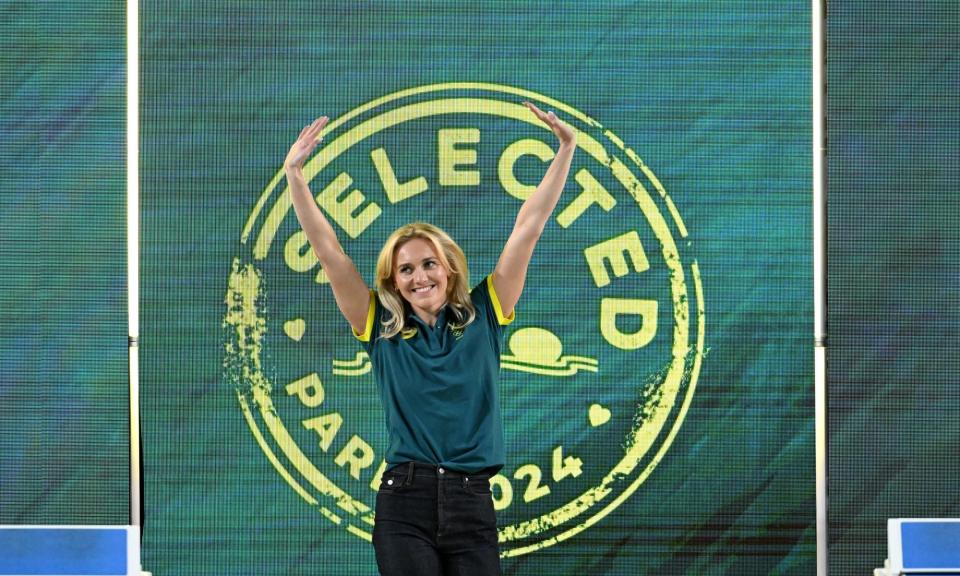Australian swimmers aiming high in Paris with sights set on knocking US off perch

Three years ago in Tokyo, the Australian swim team had their most successful Olympics. Nine gold, three silver and eight bronze medals in the pool, plus a bronze in the open water swimming, delivered the Dolphins a haul that surpassed the prior record that had stood since the 1956 Games in Melbourne.
The triumph in Tokyo left Australia second in the swimming medal tally, behind only perennial rivals the United States. At last year’s world championships, the team went one better, topping the table with a remarkable 13 golds.
Related: Paris Olympics: 10 Australian athletes you might not have heard of… yet
All of which means the Australian squad arrive in Paris this week with the weight of expectations on their shoulders. If the Australian Olympic team are going to better their best overall Games record (17 gold medals, in Athens and Tokyo), it will be built off the back of strong performances in the pool.
There are even whispers of knocking the Americans off a perch they have held for the best part of seven decades. The last time Australia beat the United States in the swimming medal tally was in 1956; since then, the Americans have only twice failed to win the duel in the pool, at Moscow 1980, when they boycotted, and at Seoul 1988 (beaten by East Germany who were subsequently accused of state-sponsored doping).
“Sixty-eight years of them topping the Olympic medal tally,” said Australian head coach Rohan Taylor at his team’s trials last month. “It’s like an America’s Cup type of thing, no-one has been able to take them down.”
But while the prospect of overhauling the Americans in Paris might be enticing for Australian fans and has received plenty of headlines on both sides of the Pacific, Taylor has been insisting his team’s focus is solely on the task at hand. “We don’t talk about it internally, I can promise you that,” he said. “We just talk about the athletes and what they need to perform.”
For the head coach, who took over the role four years ago, matching or even bettering the record-breaking performance in Paris is just a numbers game. “Whatever they swim here,” he said at trials, “we want them to swim either on time or improve [in Paris]. If they do that and they’re highly-ranked, chances are they’ll get on the podium. And if we can get a lot of highly-ranked athletes there and then they perform well, the medal tally will fall our way.”
The Dolphins’ swim meet begins on Saturday, and will stretch over nine days until the following Sunday. It is a packed schedule with Australia boasting medal prospects on every evening of finals action; there is only one day of racing where Australia does not present a genuine gold medal threat.
The first evening at the pool, 24 hours after the opening ceremony, will offer up a mouth-watering taste of what might follow. It will be headlined by a three-way clash in the women’s 400m freestyle. Defending champion Ariarne Titmus will face down American swimming great Katie Ledecky and Canadian prodigy Summer McIntosh in what shapes up as a defining race of the meet. Australia’s Titmus won the event at last year’s world championships comfortably, setting a new world record in the process; she will enter as favourite, but not underestimating her foes.
Related: ‘A perfect storm in Paris’: Australian swimmer Sam Short eyes Olympic treble | Kieran Pender
The women’s race will follow the opening medal event of the meet, the men’s 400m freestyle. Australia bring two medal contenders to Paris in the form of 2022 world champion Elijah Winnington and 2023 world champion Sam Short. But they face a tough field, including Germany’s Lukas Märtens, who owns the best time of the year so far.
The first evening will conclude with both 4x100m freestyle relays. Barring disqualification, Australia’s women are overwhelming favourites to claim gold – their world record breaking time at last year’s world titles was nearly four seconds faster than silver medallists the United States. The men’s race is expected to be tighter – Australia won last year’s world title, but with barely a second between them and fourth-placed China.
The anticipated golden first day will segue into eight more days of action for the Dolphins. Medals are expected in the majority of relays; Taylor had previously indicated a desire to go “seven from seven” – win a medal in every relay (Australia finished on the podium in all but one of the relays in Tokyo) – although weakness in one or two strokes will make the medley relays and mixed medley relay challenging.
The showdown between Titmus and compatriot Mollie O’Callaghan will be compulsory viewing, after an astonishing race at trials saw the Olympic champion Titmus dethrone 2023 world champion O’Callaghan. Kaylee McKeown will be looking to improve on her golden Tokyo meet, where she won two individual gold medals, with a third individual event - the 4x200m individual medley. Short will also go for gold in the 800m freestyle, Zac Stubblety-Cook will seek to defend his Olympic title in the 200m breaststroke and Cameron McEvoy will aim to make history and become the first Australian man to win the men’s 50m freestyle at the Games.
All in all, it shapes up to be a frenetic week for Australian swimming – and possibly the best chance in living memory for the Dolphins to upset their American counterparts and finish atop the medal tally. “It’s going to be interesting,” Taylor said last month. “We’re going to do our best to grab what we can.”

 Yahoo Sport
Yahoo Sport 



































































